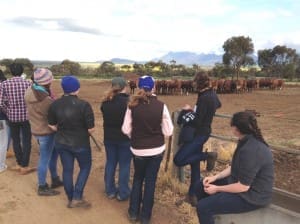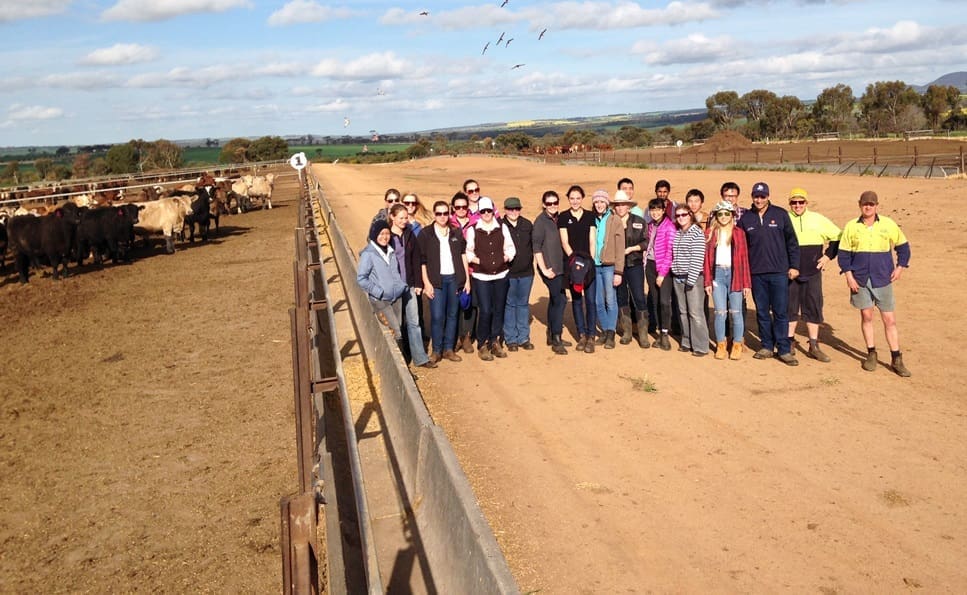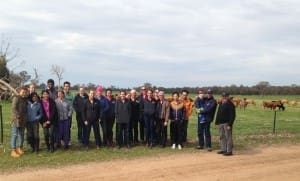Connecting the theory learnt at university with industry know-how and experience is vital for any agricultural graduate who wants to have an impact in their chosen field.
For Australian agriculture to remain competitive into the future, it is our current university graduates who need to be exposed to global best-practice and new ideas.
This was the thinking behind a five-day tour of agricultural enterprises throughout Western Australia’s South-West region undertaken by 22 Murdoch University third-year animal science students recently.
Led by associate professor Andrew Thompson and Dr Peter McGilchrist, the Perth to Albany expedition stopped in on 14 of the state’s leading beef cattle, prime lamb, wool, pork, chicken and dairy production and processing enterprises.
Dr McGilchrist said industry professionals shared the latest ideas and technologies with the students and gave insight into the challenges, rewards and opportunities of working in agriculture as a food and fiber producer.
“It is very refreshing to get off campus and immerse these future graduates into the wealth of knowledge possessed by some of the best sectors of various supply-chains in the state,” Dr McGilchrist said.
Topics covered included the use the Estimated Breeding Values for cattle and Australian Sheep Breeding Values for sheep. During the week students also compared the genetic gain that has been made in the dairy, pork and poultry industries to increase the productivity of those animals.
At properties like Glenridge Park owned by David, Lyn and Andrew Slade, the students experienced first-hand a mixed beef, sheep and cropping enterprise at the cutting edge of technology.
“Glenridge Park’s major focus’ are soil fertility, new pasture cultivars, the use of labour-saving devices to increase labour efficiency, the mating of ewe lambs plus they were conducting research with Murdoch University and DAFWA into the impact of nutrition and birth weight on lamb mortality,” Dr McGilchrist said.
He said direct contact between students and producers helped students develop their skills and link theoretical knowledge with production on the ground.
“It also helps industry identify talent and helps develop the knowledge base of future employees,” he said.
All 22 students received a scholarship from Australian Beef Industry Foundation (ABIF) to assist with costs of the tour, because ABIF has a vision to attract, educate and retain young people in all aspects of the beef supply chain to create a smarter, more profitable and sustainable beef industry.
The industry tour was also generously supported by Australian Wool Innovation and the Murdoch University Veterinary Trust.
“Murdoch University and the agricultural sector are extremely fortunate to have a supportive network of organisations with a vision for the future that are committed to nurturing the next generation of Animal Science graduates,” Professor Thompson said.
“As part of the experience, the students also had to create short videos for YouTube about a particular aspect of the beef or sheep industry. Students realise the need to educate the wider community about the importance of agriculture one view at a time”
 Third-year student Amy Brown said the experience was invaluable.
Third-year student Amy Brown said the experience was invaluable.
“It’s one thing to hear about production systems in theory, and what farmers could be doing to be productive, but it’s essential to see it in practice, and to see it work,” she said.
“Farm Pracs are great for learning basic skills if you haven’t had the chance to gain earlier, but seeing farmers at the top of their fields is very interesting, and makes what we learn seem much more useful. Many farmers that we come into contact with vary greatly to the research we learn in class. The trip was very informative and eye-opening.” she said.
During the five days, students visited Hillcroft Farms, Summit Gelbviehs, Genstock Breeding services, Glenridge Park Cheviots/Border Leicesters/Greelines and Sussex, Chuckem Merinos, Daniels Well Feedlot and Butterfield Beef, WAMMCO processing plant, the new Katanning sheep sale complex, Moojepin Multipurpose Merinos, Mt Barker Free Range Chicken, Plantagenet Free Range Pork, M & C Jenkins Dairy and a CSBP fertilizer trial site.
- As a charity, ABIF seeks to raise funds from donors and apply these to provide opportunities to deepen the commitment of young people to careers in the Australian beef industry. This work goes across all sections of the beef supply chain to create a smarter, more profitable and sustainable Australian beef industry. ABIF seeks to encourage the next generation to be involved in beef Australia through education and training that is focused on efficiency and competitiveness leading to financially rewarding and successful careers.


